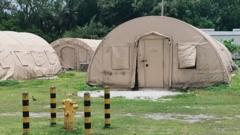On the isolated British island of Diego Garcia, a remote military base in the Indian Ocean, a mother, known as Shanthi, dreams of raising her children in a semblance of normalcy, despite their appalling circumstances. For three years, she and her family lived in a migrant camp described by Shanthi as "like an open prison." The harsh environment, constant surveillance, and isolation shaped their daily existence in a makeshift compound surrounded by a security fence.
Caught in a harrowing journey while fleeing persecution linked to the Sri Lankan civil conflict, Shanthi, along with her husband and young children, found themselves accidentally stranded on this military fortress after a fishing boat disaster led to their rescue by the Royal Navy in 2021. Initially without formal education for six months, Shanthi, a trained teacher, took it upon herself to impart English language skills to her children, utilizing materials available within the camp to facilitate their learning.
In an effort to combat the monotony and lack of conventional amusement facilities, Shanthi turned her training in Bharatanatyam, an Indian classical dance form, into dance lessons for her children, employing music downloaded on her phone. She curated a nurturing environment despite the struggles, even cultivating vegetables using coconut husks collected from the island to alleviate the bland American meals provided by the military.
While Shanthi's family endured several hardships, including the presence of rats and adverse weather conditions that compromised their tent, they also experienced small acts of kindness from some guards that occasionally brightened their days. However, the oppressive nature of their confinement led to a crisis, with reports of mental health challenges arising within the camp, including self-harm incidents among the children, which worsened as isolation continued.
Over the years, Shanthi and her fellow migrants sought to initiate asylum claims for a safer living situation, marking the first requests of this nature ever made on the island, igniting a prolonged legal battle far from home. Eventually, British authorities acknowledged the unsuitable conditions and facilitated their transfer to the UK in a "one-off" case intended for their welfare.
Upon arriving in the UK, Shanthi and her family faced a stark contrast—the cold climate felt as if they had awakened from a lengthy stupor. They expressed hopes for a more stable life, but uncertainty loomed, as they now faced the challenge of filing asylum claims and integrating into a new society with their past experiences weighing heavily on them.
The family's journey from the confines of Diego Garcia encapsulates both profound challenges and resilience, leaving behind a part of their identity while moving towards an uncertain future. Shanthi plans to carry a shell from the island as a reminder of their ordeal, underlining the duality of memory and survival in her family's narrative.





















